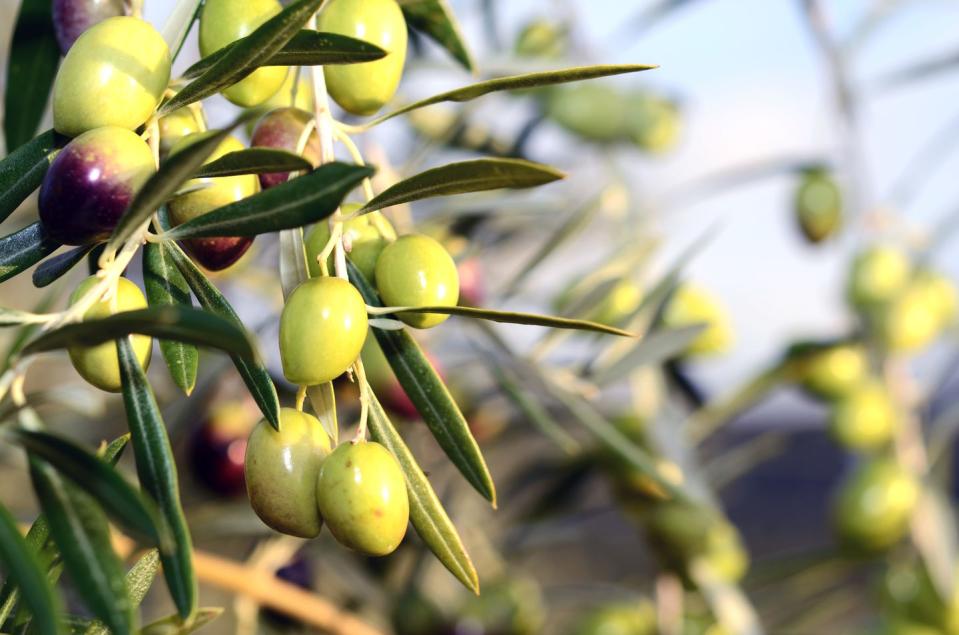We Looked Into Whether Olive Leaf Extract Can Reduce Your Disease Risk

You already know that olive oil is pretty much liquid gold. A staple of the heart-healthy Mediterranean diet, the go-to cooking oil is used in everything from soups to salads to stir-fries.
But what about olive… leaf extract? You might’ve come across the buzzy herb on Instagram, where it’s touted as a med-free way to lower blood pressure naturally, stabilize blood sugar, boost your immune system, and more.
But can olive leaf extract really tame inflammation to reduce your risk of disease? Here’s what you should know before shelling out for this supplement.
What is olive leaf extract, exactly?

Olive leaf extract is an extract taken from the leaves of the olive tree. (Yes, the same type of tree where olive oil comes from.) And like olive oil itself, people have been reaping the benefits for a pretty long time. For thousands of years, traditional Mediterranean cultures have used parts of the olive tree to treat everything from infections, to constipation, to high blood pressure. Indeed, a growing body of evidence suggests that olive leaf extract’s antioxidant, anti-inflammatory properties have the potential to boost your health.
What makes the stuff different from the olive oil in your pantry? Olive leaf extract has many of the same beneficial properties as the healthy fat-but in a much more concentrated form, explains integrative dietitian Ali Miller, RD, CDE.
It’s easier on your waistline, too. Dried, powdered olive leaf extract capsules serve up therapeutic doses of some of the compounds found in olive oil in a form that’s virtually calorie-free. To get a similar effect from olive oil, you’d likely have to consume many, many spoonfuls (and hundreds and hundreds of calories), Miller says.
What are the benefits of olive leaf extract?
The benefits of olive leaf extract are thought to come from the polyphenol compound oleuropin. “Oleuropin has anti-inflammatory, antioxidant, antibacterial, and immune-stimulating properties,” says physician and integrative health expert Monisha Bhanote, MD, FASCP, FCAP. Experts are still learning about what oleuropin might be able to do to improve our health, but here’s what the science says so far.
Protect your heart
Olive leaf extract seems to have a positive effect on factors that can influence heart disease risk. When men with prehypertension (blood pressure measuring between 120/80 mmHg and 139/89 mmHg) took olive leaf extract for six weeks, they saw a drop in their blood pressure, cholesterol, and triglycerides, as well as certain inflammatory markers, found a European Journal of Nutrition study.
Reduce diabetes risk
Adults with type 2 diabetes who took olive leaf extract twice daily for 14 weeks had lower fasting blood sugar levels compared to those who took a placebo, Israeli research found. The reasons aren’t fully understood, but it could be that olive leaf extract slows the digestion of starches into simple sugars and helps keep glucose from building up in the bloodstream where it could raise blood sugar, Dr. Bhanote says.
Fight cognitive decline
Both test tube and animal studies suggest that olive leaf extract’s anti-inflammatory effects could help play a role in protecting the brain from Alzheimer’s disease, according to a 2018 review of research. “Olive leaf extract can reduce the damage caused by oxidative stress,” explains Dr. Bhanote.
Help prevent cancer
Those antioxidant, anti-inflammatory properties have also been shown to fight the growth of breast, colorectal, pancreatic, and prostate cancer cells, as well as leukemia cells, according to a Nutrients review. Just keep in mind: Most of the research has been done on animals or in test tubes, so it’s far from conclusive.
Protect your joints and bones
Some studies have shown that patients with osteoarthritis have an improvement in pain and function after taking olive leaf extract, a recent review reports. Findings show that olive leaf extract might help stave off age-related bone loss, too. “Oleuropein may prevent the accumulation of fat in bone marrow, which can contribute to developing osteoporosis,” Dr. Bhanote says.
Fight cold and flu
Olive leaf extract boasts antimicrobial properties, according to a review of test tube studies. And research on animals has found that olive leaf extract stops the flu virus from replicating. Still, we wouldn’t recommend it as a replacement for your flu shot quite yet.
Does olive leaf extract have any side effects?
Olive leaf extract might be natural-but that doesn’t automatically mean it’s completely harmless. “The most common side effects may include headache and stomach discomfort,” Dr. Bhanote says. Why? Experts aren’t totally sure, but it could be due to olive leaf extract supplements being contaminated with heavy metals or other substances, she explains. That’s why-like with all herbal supplements-it’s important to do your homework and buy from reputable brands that you trust.
What’s the best way to take olive leaf extract?
You can find olive leaf extract in tinctures, capsules, and teas. There’s no consensus on which is best, so if you want to give olive leaf extract a try, you might be better off focusing on the dosage rather than the delivery method. “Doses from 250 mg to 2,000 mg are seen as effective in studies for cardiovascular disease and inflammation,” Miller says. Reminder: Always talk with your doctor before starting a new supplement, especially if you are already taking prescription medications.
But is the stuff really worth taking? Despite the promising research, not everyone is convinced yet. “I recommend getting your oleuropein from olive oils and a Mediterranean diet,” Dr. Bhanote says.
('You Might Also Like',)

